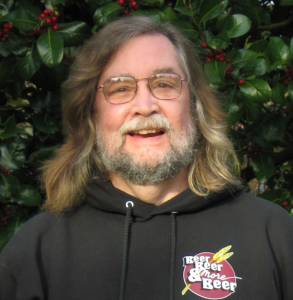Private Tastings: What inspired you to begin homebrewing?
Denny Conn: I started cooking for a hobby after I first saw Julia Child when I was about 13 years old. Also, growing up in the 60s and 70s kind of gave me a “do it yourself” kind of attitude. Once I moved to the Pacific Northwest in the mid 70s I discovered some of the great new craft beers that were happening here. I really wanted to make them myself, but it wasn’t until my business partner started brewing and showed me how easy it was that I was really hooked. It was cooking to the max, combined with science, another major interest of mine…and you got to drink the results!
PT: One could say there are two extremes when it comes to brewers – artistic brewers who eschew exacting measurements and style classifications, and scientific brewers who aim for precision and consistency over creativity. Do you lean more to one side than the other, or would you fall in the “a little of both” category?
DC: I’m firmly in the “a little of both” camp. Precision and consistency are wonderful things, but it’s not necessary to think of them as mutually exclusive to artistry and creativity. For me, it’s the science and precision I’ve learned that give me the knowledge and confidence to pull off the crazy ass stuff, like Bourbon Vanilla Imperial Porter or Chanterelle Wee Heavy.
PT: If you could give only one piece of advice to a homebrewer who wants to make better beer, what would it be?
DC: Pay attention to what you do and how your beer reacts to it. And that starts by learning some fundamentals so that you know what to pay attention to. When I started brewing, I found what was about the only Internet resource at the time, the rec.crafts.brewing Usenet newsgroup. To this day, I still check in there every day. I learned to recognize the more experienced people and try out what they said they were doing, especially if some of what they said matched experiences I’d previously had. Sometimes their advice worked for me, and sometimes it didn’t. But this is the course I’d advise every new brewer to follow…gather all the information from various sources that you possibly can and filter it through your own experience. Identify people whose advice and experience you think you can trust, and try things to see what works for you. Before too long, your own experience will make you the expert.
PT: You are probably best known to the brew world for two things: your promotion of batch sparging, and your killer recipes. Starting with batch sparging – what was the reaction you got from fellow homebrewers when you first started promoting the technique?
-and-
PT: How did you come about using batch sparging in your own brewing? Was it a sudden epiphany, or a gradual evolution?
DC: I learned about batch sparging first from a mention in the HomeBrew Digest from George Fix. I’d already done a couple stovetop, hand-fly-sparged batches and found it total pain. Then, I ran across an article by Ken Schwartz that explained how to batch sparge and provided equations for calculating amounts of grain and water. Another article by Ken had plans for building a cooler mash tun using one of Jack Schmidling’s SureScreens (all of Ken’s articles are available at http://home.elp.rr.com/brewbeer/). I tried it and was amazed by how much easier it made things and the quality of the beer that came from it. I began talking about it on rec.crafts.brewing. There was a LOT of skepticism from brewers……I recall one person saying he’d told the owner of the LHBS about it and was told it would make “dirty beer”!
Fortunately, a few posters on rcb were already doing it so I had some support. One of them was Bob Regent, who had been around a while and was a respected brewer. He talked about how he had given up his fly sparging rig for batch sparging. He not only backed me up, I also learned a lot from him. And it never hurt to mention that George Fix thought highly of it! Eventually, people started trying it and getting the same kind of great results that I had. I think I started using the hose braid after someone on HBD had said something to the effect that “if the SureScreen worked, it seems like the braid off a toilet hose would work”. I tried it, and sure enough, it worked great. So the entire system was put together from a collection of various ideas that I tried to weave together into single system and technique. These days, I’d wager that there are as many homebrewers batch sparging as fly sparging.
Editor’s Note: We at lootcorp.com are firmly in the batch sparge camp, all thanks to Denny’s great tutorial page, Cheap ‘n’ Easy Batch Sparge Brewing. Check it out.
PT: Regarding recipes, how did you come up with such favorites as your RyePA, Nick Danger Porter, and Bourbon Vanilla Imperial Porter? These are all big, robust beers with complex taste profiles. Were they the result of random experimentation, or were they carefully planned out? How many batches did you have to go through before you got to the “final” versions?
DC: I’m more of a “plan it out and brew it” guy than a “throw some stuff in there and see what happens” guy. Sometimes that works in my favor, other times it might constrain me from trying something new. But for most recipes, I fall back on my cooking skills…I use my “taste imagination” to either “visualize” what the finished beer will taste like, or what the combo of ingredients I use will taste like. Then I brew the first iteration and evaluate how close it came to what I was shooting for. In the case of the Rye IPA recipe, it began with the idea to brew an IPA using Mt. Hood and Columbus hops. It was going to be a special beer for my wife’s annual birthday party since she likes super hoppy IPAs. I brewed several variations and ran each by her for comments. At one point, I thought about using some rye for part of the base malt, and brewed several more versions to get the right balance of rye and the specialty malts. Altogether, I’d say I brewed it maybe 10-12 times before we settled on the final version. The BVIP took about 4-5 test batches of the base porter before I got it to the point where it would play nice with the other flavors in there (BTW, a good friend uses the base porter recipe to make a delicious coffee porter). I’d say that Nick Danger took about 3-4 tries.
PT: I just brewed my first batch of RyePA with the Denny’s Favorite yeast – I’ll be reviewing my batch shortly after posting the interview!
DC: GREAT!!!
PT: Wyeast recently named one of their Private Collection strains after you – can you give a brief description of the strain and how it came to be called “Denny’s Favorite”?
DC: Early on in my brewing hobby, I decided I wanted to start ranching yeast and bought the equipment and a few plates of yeast from a company called Brewtek. I had no idea what most of the yeasts were like. One of them was “California Pub Ale Yeast CL-50”. I tried it in a batch of Rye IPA and found that it gave the beer exactly the kind of mouthfeel I loved…rich and silky, but very clean. I used the yeast, keeping it on slants, for many years, all the while extolling it to other homebrewers. One of the guys in our club tried it and liked it as much as I did. Fortunately, he’s a microbiologist in real life and took over keeping it in our club’s yeast bank, which he also manages. Brewtek closed down and the strain bounced between a couple other companies for a few years before the last one to have it closed down also. In the meantime, other brewers had begun using it and loving it, and many more wanted to but were unable to source it.
I spoke with Dave Logsdon about Wyeast carrying it at a homebrew comp in about 2005 and again later that year at NHC in Orlando. He was interested, but at that time another company had it so he declined. After the final company carrying it closed down, Wyeast contacted me to get a sample for their lab, so the WY2450 people buy from Wyeast came right out of the club yeast bank! Apparently, they got really great response from it and are considering releasing it again. If people are interested in seeing it come back, they should contact Wyeast and let ‘em know they want it!
Editor’s Note: It really is some great yeast – get on Wyeast’s case about re-releasing it, and when you see it on the shelves again, buy some!!
PT: Being a homebrew celebrity must come with some benefits – besides having yeast strains named after you, have you enjoyed any other cool perks?
DC: Wow, “homebrew celebrity”…that’s kinda a weird concept to grasp! I’ve been lucky in that since I love to talk about beer, my name has gotten around. Sometimes I get samples of new products, sometimes other homebrewers ship me their beer to try…but I’d have to say the biggest perk for me is when somebody says to me that they learned to brew AG beer by reading what I’ve written, or that they brewed on of my recipes and loved it. I got so much help from more experienced brewers when I started brewing, and it’s a real pleasure for me to pay that back by helping others when I can. For me, being part of the community of homebrewers is the biggest perk of all!
Well, there you have it. I think that was a great interview, and I’d like to say thanks again to Denny for spending the time on it. Look for the review of my batch of RyePA in the next day or two!

